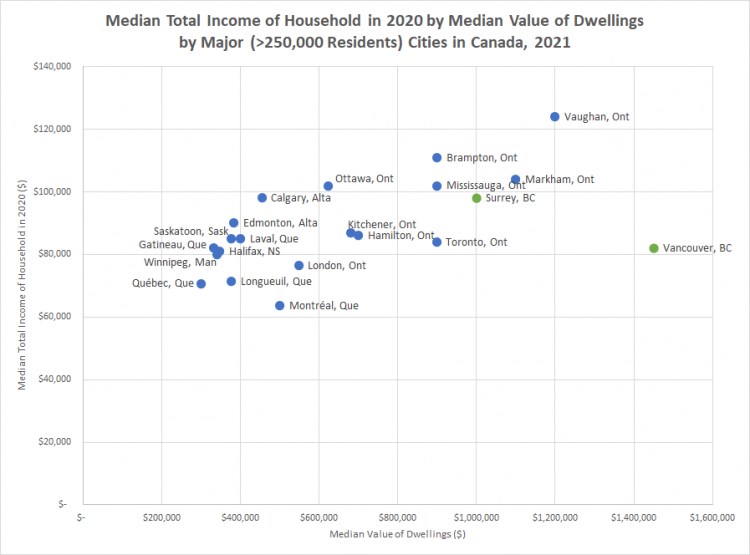Just days before the municipal elections in Vancouver, the latest data analysis from a leading urban planning expert in the city again highlighted just how big the affordability problem is for the city and the region at-large.
In the latest analysis by Simon Fraser University City Program director Andy Yan (based on 2021 Census data from Statistics Canada) charting Canadian cities’ 2020 median value of dwellings when compared to household income levels, Vancouver remains a salient outlier in terms of the disparity between prices and people’s wages.
In the report, Vancouver recorded a 2020 median dwelling value of $1,450,000 – 18 times the amount of the city’s median total income per household ($82,000). Among major Canadian cities, no one else is close to that 18x multiple – including Surrey, which reported a dwelling value of $1 million against a household income average of $98,000, a 10x multiple.
In comparison, the only other major centre (with populations above 1 million in the surround CMA) with a double-digit multiple is Toronto (dwelling value $900,000 – household income $84,000, for an 11x multiple). Meanwhile, Montreal (multiple of 8), Ottawa (multiple of 6), Calgary (multiple of 5) and Edmonton (multiple of 4) all sit below that threshold, indicating a narrower disparity between people’s incomes and housing costs.

“It is really illustrative of the considerable challenges that’s on both the supply and the demand side of the equation,” Yan said. “It shows we have a certain level of local income in the City of Vancouver while also having a housing stock that doesn’t seem to be able to meet that demand.”
Yan has been a frequent critic of the city’s growing affordability crisis, an issue that has been overwhelmingly identified as the top topic of debate in the Oct. 15 municipal elections.
In July, Yan released a data analysis looking specifically at median household incomes and found that while Metro Vancouver has seen a rise in income levels from the last census in 2016, the earning threshold of the region is closer to that of smaller centres like Regina, Saskatoon and Hamilton, Ont. Than that of other major CMAs like Toronto, Calgary, Ottawa and Edmonton.
While Yan said there is concern that the issue has been in the news so much that it may lose its resonance with Vancouver residents, he added that the statistics showed that there was a time – as recently as two decades ago – where the income-to-housing-cost ratio was not so lopsided.
It means that, with the proper recognition and effort, it is not inconceivable for Vancouver to improve its affordability – because it had been done before.
“Vancouver was always expensive, but it wasn’t to this level,” Yan said. “In the 1990s, things were more clustered, and the fact is that it did change from the 1990s to now... The statistics show us that change is possible; in this case, a change to being more affordable is possible. It’s really a question of what kind of leadership can take us there.”
A key issue that needs to be addressed by whoever is elected to City Hall, he added, will be raising the income side of the equation (despite public attention focused on home prices).
“The lesson here is, where is the economic development?” Yan said. “Where’s the conversation about expanding and growing our economy in a sustainable, inclusive way? How can we work out how to pay for housing, transportation and everything else we aspire to be as a region?”




